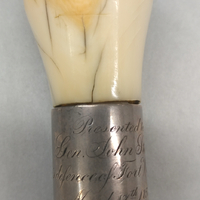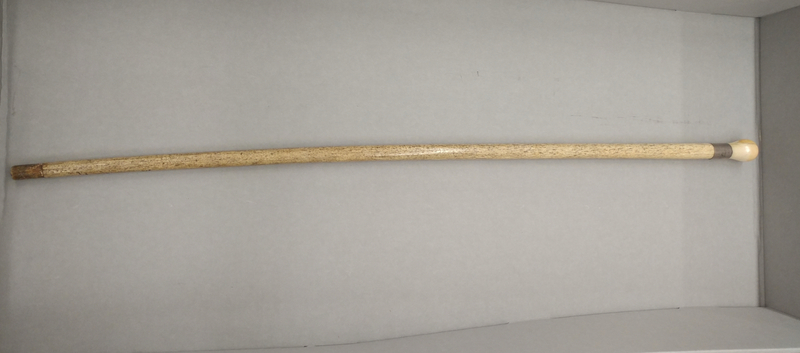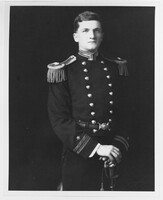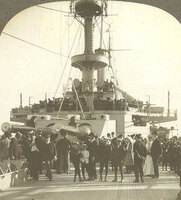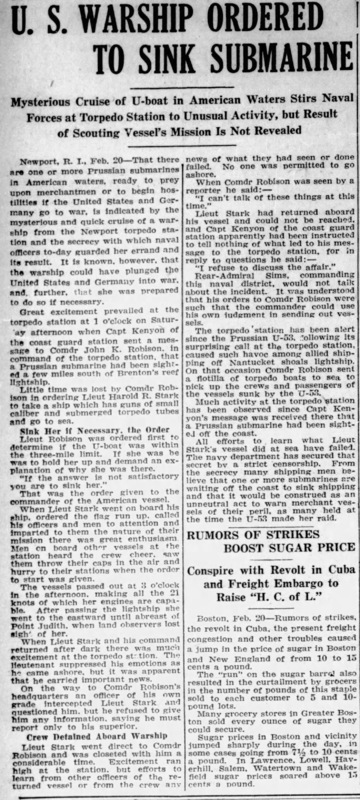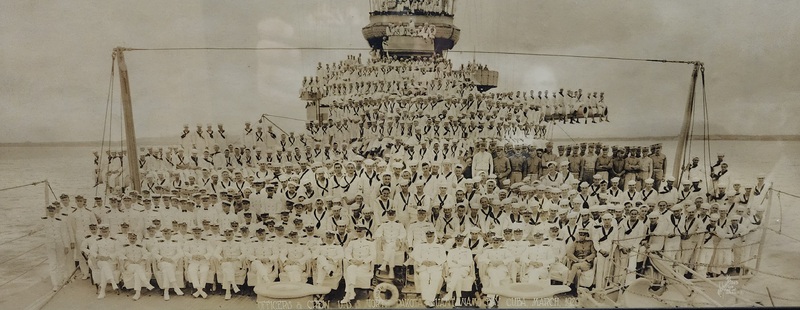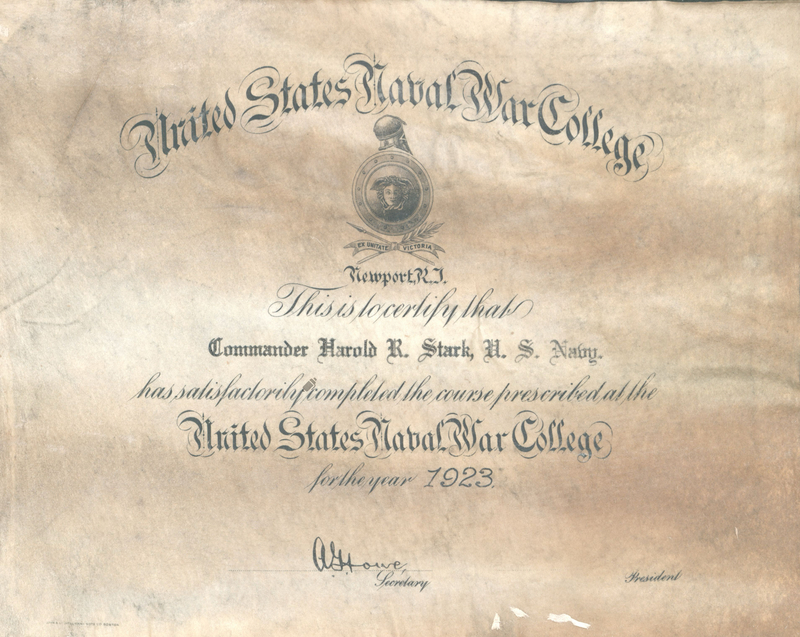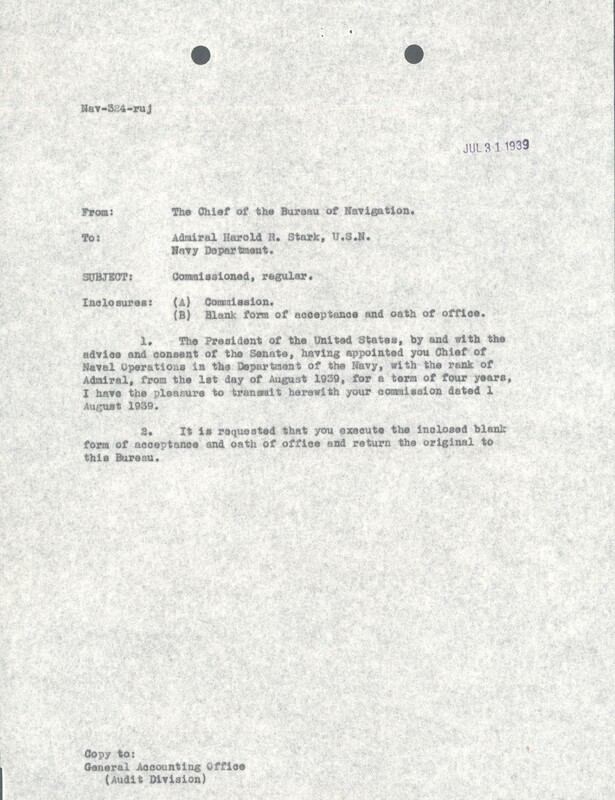Early Military Career
In 1899, Stark enrolled at the United States Naval Academy. As an incoming freshman, Stark was affectionately nicknamed “Betty” by an upperclassman. The upperclassmen thought that Harold was related to General John Stark who served in the American Revolution. Since Harold Stark was neither related to, nor did he know of the general of his same name, the upperclassmen informed him that prior to the Battle of Bennington, General Stark declared, “We will win today or Betty Stark will be a widow,” (Symonds, Craig L. World War II at Sea: A Global History. Oxford University Press, 2018, p.180).
![<a href="/omeka/items/browse?advanced%5B0%5D%5Belement_id%5D=50&advanced%5B0%5D%5Btype%5D=is+exactly&advanced%5B0%5D%5Bterms%5D=Painting+of+the+Battle+of+Bennington%2C+%3Cspan+style%3D%22font-weight%3A400%3B%22%3E%5Bca.+late+nineteenth-early+twentieth+century%5D%2C+%3C%2Fspan%3E%3Ca+href%3D%22https%3A%2F%2Frevolutionarywar.us%2Fyear-1777%2Fbattle-of-bennington%2F%22%3ERevolutionary+War.US.%3C%2Fa%3E">Painting of the Battle of Bennington, <span style="font-weight:400;">[ca. late nineteenth-early twentieth century], </span><a href="https://revolutionarywar.us/year-1777/battle-of-bennington/">Revolutionary War.US.</a></a> <a href="/omeka/items/browse?advanced%5B0%5D%5Belement_id%5D=50&advanced%5B0%5D%5Btype%5D=is+exactly&advanced%5B0%5D%5Bterms%5D=Painting+of+the+Battle+of+Bennington%2C+%3Cspan+style%3D%22font-weight%3A400%3B%22%3E%5Bca.+late+nineteenth-early+twentieth+century%5D%2C+%3C%2Fspan%3E%3Ca+href%3D%22https%3A%2F%2Frevolutionarywar.us%2Fyear-1777%2Fbattle-of-bennington%2F%22%3ERevolutionary+War.US.%3C%2Fa%3E">Painting of the Battle of Bennington, <span style="font-weight:400;">[ca. late nineteenth-early twentieth century], </span><a href="https://revolutionarywar.us/year-1777/battle-of-bennington/">Revolutionary War.US.</a></a>](https://omeka.wilkes.edu/omeka/files/square_thumbnails/a75780b1739419456268c98cdc924388.jpg)
Painting of The Battle of Bennington by Frederick Coffay Yohn, [ca. late nineteenth-early twentieth century], which illustrates John Stark leading his men into the Battle of Bennington. Revolutionary War.US; ACD 2025
There is an Ivory cane, featured above, that presents the inscription “Presented to Gen. John Stark for his Defence of Fort William Henry, 1757 March 17,” (John Stark’s Ivory Cane, with an Inscribed Metal Band Underneath the Rounded Top that Says “Presented to Gen. John Stark for his Defence of Fort William Henry, 1757 March 17, Object Box: 1, Object: 1. Wilkes University Archives.”). Ironically, this cane was presented to him by the British Army who he fought against in the Battle of Bennington.
The upperclassman demanded that Stark repeat this announcement on demand throughout his plebe year, hence spurring the nickname, “Betty.”
![<a href="/omeka/items/browse?advanced%5B0%5D%5Belement_id%5D=50&advanced%5B0%5D%5Btype%5D=is+exactly&advanced%5B0%5D%5Bterms%5D=Photograph+of+Francis+Thomas+Evans+with+Message+and+Signature%0D%0A%5Bca.+mid+twentieth+century%5D%0D%0A">Photograph of Francis Thomas Evans with Message and Signature<br />
[ca. mid twentieth century]<br />
</a> <a href="/omeka/items/browse?advanced%5B0%5D%5Belement_id%5D=50&advanced%5B0%5D%5Btype%5D=is+exactly&advanced%5B0%5D%5Bterms%5D=Photograph+of+Francis+Thomas+Evans+with+Message+and+Signature%0D%0A%5Bca.+mid+twentieth+century%5D%0D%0A">Photograph of Francis Thomas Evans with Message and Signature<br />
[ca. mid twentieth century]<br />
</a>](https://omeka.wilkes.edu/omeka/files/fullsize/1c6f009c4fd42e4299e818690b7a73d9.jpg)
Photograph of Francis Thomas Evans with Message and Signature [ca. mid twentieth century] Stark collection.
Transcription:
For “Betty” Stark
The man with the cheerful Aye! Aye!
With best regards of
T. Evans
After graduating from the United States Naval Academy in 1903, Harold Stark served as a lieutenant in various stations of the Atlantic fleet. Notably, Stark served on the battleship USS Minnesota during the US Atlantic fleets’ great cruise of the world, known as the “Great White Fleet’s” “World Tour.” (Naval History and Heritage Command. “Stark, Harold R.). The below portrait was likely taken in San Francisco in 1908, during this tour. After this tour, Stark served on torpedo boats, cruisers, and other battleships including: The Porter, Stringham, Lamson, Patterson, and Brooklyn. This photograph was taken only 5 years after Stark’s Graduation from the US Naval Academy. To the right is a photograph of the USS Minnesota, one battleship of many that Harold Stark would serve on.
In 1915, Stark was stationed as a commander of a land torpedo base in Newport Rhode Island where he was stationed until June of 1917.
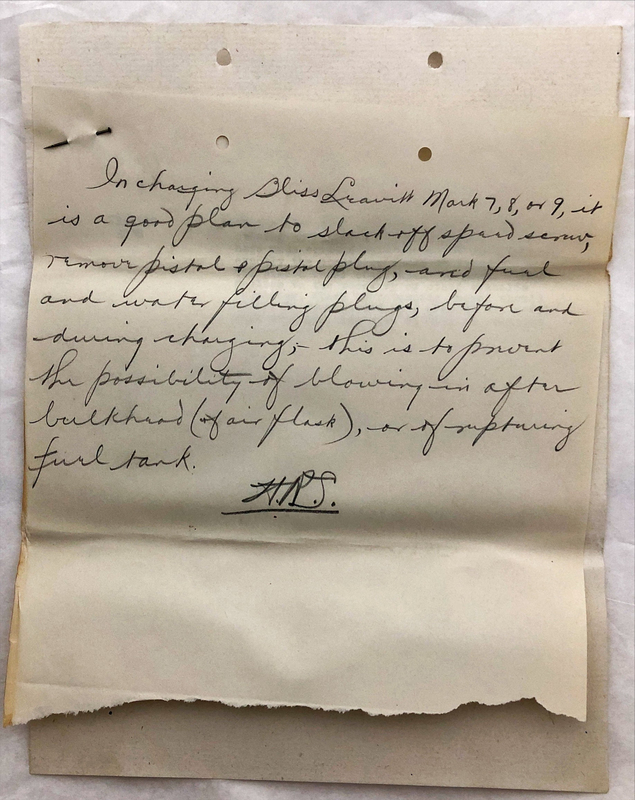
Revised Service Torpedo Instructions, by Harold “Betty” Stark, 1915 Sep 8, found on US Naval War College; ACD 2025
Throughout his time as a commander, Stark was involved in an incident involving a German U-boat that was off the coast of New Hampshire. Below is an article written about the situation:
The article published in the St. Louis Globe-Democrat on February 20, 1917, details a tense naval episode off Point Judith, Rhode Island, amid growing fears of German submarine activity near American waters. It describes the secretive dispatch of a U.S. Navy vessel from the Newport torpedo station in response to a report of a German U-boat sighting near Brenton's Reef Lightship. Commander Robison ordered Lieutenant Harold R. Stark to investigate and, if necessary, engage the submarine.
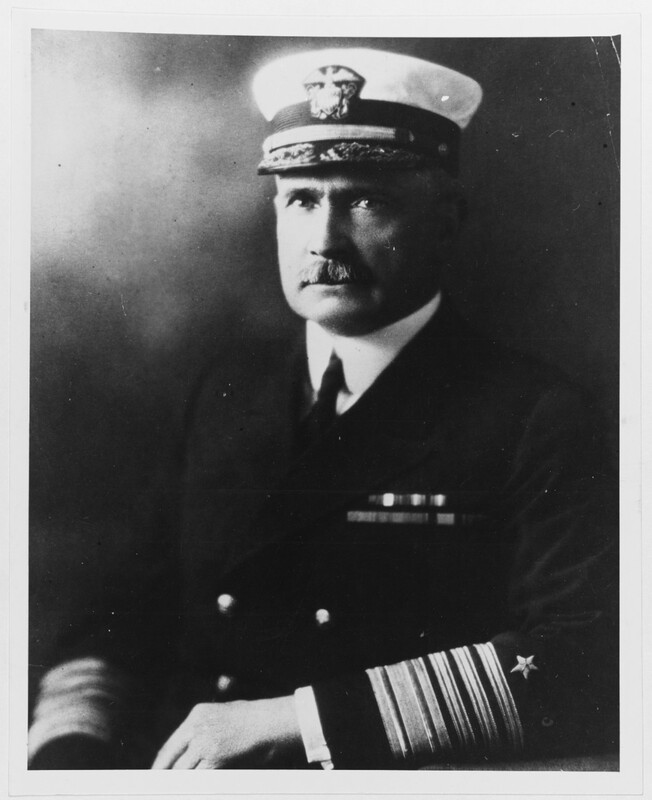
Photograph of Samuel Shelburne Robinson (1867-1952), ca 1923, US Naval History and Heritage Command; ACD 2025
The crew's morale was high, cheering as the ship set out. Upon returning, Stark's silence and the refusal of naval officials to disclose any details intensified speculation. The military's secrecy fueled concerns that German subs were preparing to target American shipping, highlighting the tense prelude to the U.S. entry into World War I. The incident exemplifies the heightened vigilance and covert operations undertaken during this fraught period in American naval history.
Furthermore, this February 20, 1917 article from The Republican reports on the same incident.
This article also reaffirms the statements of the first by describing the mission’s secrecy, the crew's enthusiasm and the strict information blackout suggest a significant, undisclosed encounter. The article also displays the widespread fears of submarine attacks and the growing likelihood of American involvement in the escalating global conflict.
In June, he assumed command of The Asiatic Fleet’s Torpedo Flotilla which traveled to Europe to join the war effort. During World War I, he also served as Recruiting Officer, London, and Commanding Officer of the Detachment, U.S. Naval Headquarters, London where the Italian government conferred upon him the Grade of Officer of the Order of the Crown of Italy, and he was awarded the Navy Distinguished Service Medal (Naval History and Heritage Command. “Stark, Harold R. Papers,” n.d. ). After World War I, he was stationed as an executive officer on the USS North Dakota (pictured above).
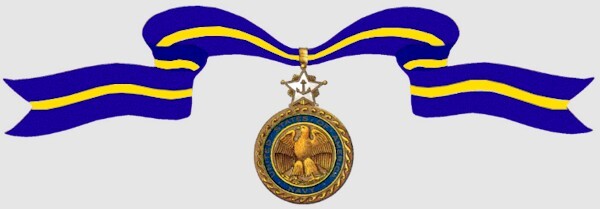
Photograph of the Navy Distinguished Service Medal, Awarded Stark in 1942 and 1948, Hall of Valor; ACD 2025
Shortly after the conclusion of WWI, Harold R. Stark graduated from the United States Naval War College in Newport, Rhode Island in 1923. Below is a scan of his original diploma.
After graduating from the Naval College, Stark was appointed as Executive Officer of the USS West Virginia in December of 1923 until December of 1924, where he was then appointed the Commander of the USS Nitro (pictured below).
After his command of the USS Nitro, Harold Stark then served as Naval Inspector of Ordnance in Charge of the Naval Proving Ground in Dahlgren, Virginia. On December 27, 1926, Stark was commissioned as a Captain and was the Chief of Staff to the Commander, Destroyer Squadron Battle Fleet. Stark was then appointed Aide to the Secretary of the Navy from November 1930 until December 1933.
![<a href="/omeka/items/browse?advanced%5B0%5D%5Belement_id%5D=50&advanced%5B0%5D%5Btype%5D=is+exactly&advanced%5B0%5D%5Bterms%5D=A+Portrait+Photograph+of+Harold+R.+Stark%2C+Aide+to+Secretary+of+the+Navy%2C+%5B1930+June+25%5D%2C+%3Ca+href%3D%22https%3A%2F%2Fwww.gettyimages.com%2Fdetail%2Fnews-photo%2Fnaval-officer-harold-raynsford-stark-in-uniform-news-photo%2F640458389%3Fadppopup%3Dtrue%22%3E%3Ci%3E%3Cspan+style%3D%22font-weight%3A400%3B%22%3EGetty+Images.%C2%A0%3C%2Fspan%3E%3C%2Fi%3E%3C%2Fa%3E">A Portrait Photograph of Harold R. Stark, Aide to Secretary of the Navy, [1930 June 25], <a href="https://www.gettyimages.com/detail/news-photo/naval-officer-harold-raynsford-stark-in-uniform-news-photo/640458389?adppopup=true"><i><span style="font-weight:400;">Getty Images. </span></i></a></a> <a href="/omeka/items/browse?advanced%5B0%5D%5Belement_id%5D=50&advanced%5B0%5D%5Btype%5D=is+exactly&advanced%5B0%5D%5Bterms%5D=A+Portrait+Photograph+of+Harold+R.+Stark%2C+Aide+to+Secretary+of+the+Navy%2C+%5B1930+June+25%5D%2C+%3Ca+href%3D%22https%3A%2F%2Fwww.gettyimages.com%2Fdetail%2Fnews-photo%2Fnaval-officer-harold-raynsford-stark-in-uniform-news-photo%2F640458389%3Fadppopup%3Dtrue%22%3E%3Ci%3E%3Cspan+style%3D%22font-weight%3A400%3B%22%3EGetty+Images.%C2%A0%3C%2Fspan%3E%3C%2Fi%3E%3C%2Fa%3E">A Portrait Photograph of Harold R. Stark, Aide to Secretary of the Navy, [1930 June 25], <a href="https://www.gettyimages.com/detail/news-photo/naval-officer-harold-raynsford-stark-in-uniform-news-photo/640458389?adppopup=true"><i><span style="font-weight:400;">Getty Images. </span></i></a></a>](https://omeka.wilkes.edu/omeka/files/fullsize/b6d29bda149fe17fec99c46238ca63e4.jpg)
Portrait Photograph of Harold R. Stark, Aide to Secretary of the Navy, [1930 June 25, Getty Images; ACD 2025
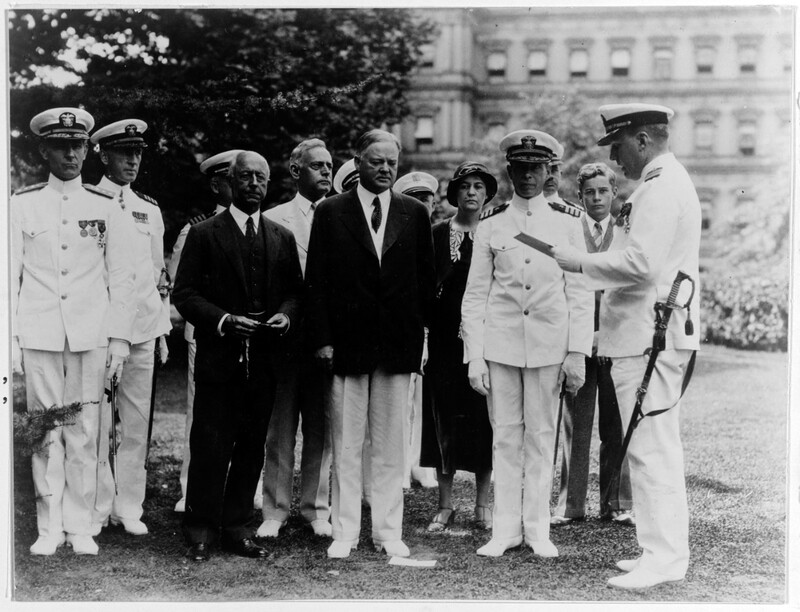
Photograph of Commander Claud A. Jones receiving the Medal of Honor with Stark present as Aide to the Secretary, USN, 1 August 1932, US Naval History; ACD 2025
He then served as the Commander of the USS West Virginia for a year and then served as Chief of the Bureau of Ordnance in Washington. Harold Stark was then commissioned as an Admiral in February 1937 and oversaw Cruiser Division Three, Battle Force, and Cruiser Battle Force as Commander. On August 1st, 1939, Admiral Stark became the Chief of Naval Operations where he served a four year term (seen below). While in this position, he requested $4 billion from Congress to increase the naval fleet by 70%. In response to this, Congress passed the Two-Ocean Navy Act, which gave Admiral Stark over double the funding he requested.
Admiral Stark held his position of Chief of Naval Operations into the beginning of World War II, where he oversaw the naval operations in both the Atlantic and Pacific Oceans.
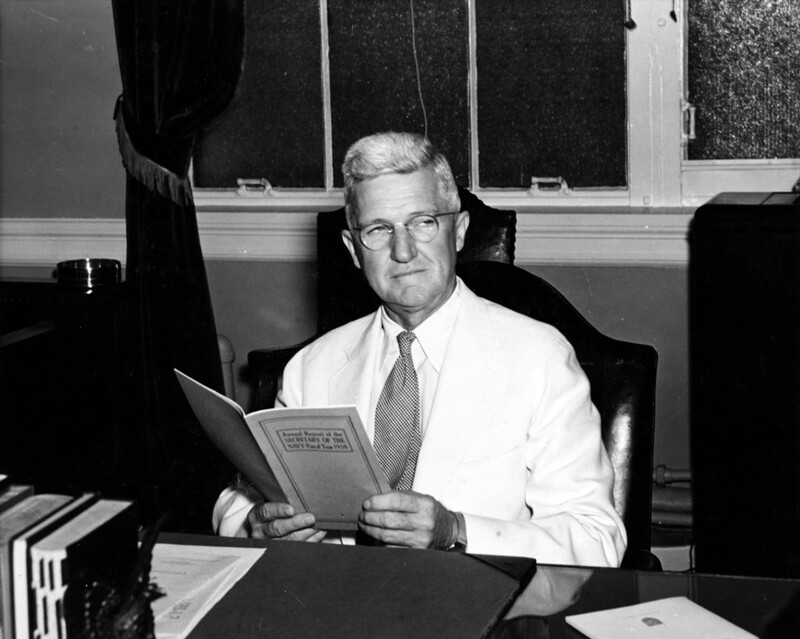
Photograph of Harold Stark, Chief of Naval Operations, 1939 August 1, found on Naval History and Heritage Command.
He also well prepared the Navy by convincing Congress to have the capability to control both oceans, which proved beneficial during World War II. After his term of CNO, Admiral Stark took on a new role that was important for the United States campaign in Europe.
